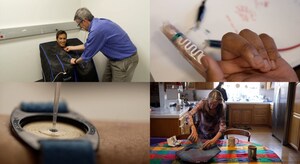CNN's Tech for Good uncovers how the ancient art of origami inspires technology
HONG KONG, Nov. 23, 2023 /PRNewswire/ -- In the latest episode of Tech for Good, CNN discovers how the beloved traditional art of Origami – folding paper into structures – has influenced technological developments. The underlying mathematical principles of origami have found its way into innovations across industries such as space and medicine, and continues to transform design thinking in these spaces. Kristie Lu Stout takes a look at three countries utilizing origami design for innovation and speaks to the artists and scientists exploring the potential of this technique.
First up, CNN speaks with Tomohiro Tachi, a professor at the University of Tokyo and pioneer in the world of computational origami design. In 2008, Tachi created a computer program known as The Origamizer – a groundbreaking algorithm that can transform any surface into a collection of triangles that can fold in a way that conforms to that 3D surface. Tachi's latest work, a program called Crane, is an interactive tool that addresses challenges facing those who hope to use origami as a design solution. Tachi also collaborates with fellow assistant professor Koya Narumi on a 4-D printer that prints materials with built-in creases that self-fold in response to stimuli.
Next, CNN visits Brigham Young University in Utah where Professor Larry Howell is working to develop a light detection and radar technology telescope larger than the ones currently used in space by NASA today, but smaller in its deployable form. Howell seeks to combine the principles of Origami systems with design elements like cuts, hinges and magnets to create a telescope the size of a large suitcase at deployment. NASA engineer Mark Stephen highlights how minimising telescope size means more telescopes can be deployed per rocket launch, thus collecting more valuable data for the same cost.
CNN also travels to Seoul National University in South Korea where a student, Myoungseok Kim, discovered a new way of folding already folded DNA; in essence, origami of DNA origami. DNA Origami as a field has been around since 2006. It applies short strands (known as staples) programmed with specific bases along a long single strand of DNA, folding them according to the base bonds to make all types of shapes. Previously, DNA origami could only fold once, but by modeling DNA structures after paper creases, Kim and his professor, Kim Do-Nyun, have discovered a new world of motion triggered by things like PH levels, light and nucleic acid molecules. They believe that this technology can create structures with imminent real-world applications like systems for drug delivery or biosensors for early cancer detection.
Finally, CNN discovers how origami is inspiring nanotechnology in robotics at the University of Pennsylvania. Assistant professor Marc Miskin shows how these microscopic robots the size of a grain of salt can move with origami-inspired legs. Miskin believes these robots have the potential to change healthcare, for instance, through repairing damaged peripheral nerves.
Tech for Good images: https://bit.ly/3G8O9dw
Tech for Good trailer: https://bit.ly/3MWSnZp
Tech for Good microsite: https://cnn.it/3PB5DSq
Airtimes for 30-minute special:
Saturday, 25th November 4:30pm HKT
Sunday, 26th November 4:00am, 12:00pm and 8:00pm HKT
About CNN International
CNN's portfolio of news and information services is available in seven different languages across all major TV, digital and mobile platforms, reaching more than 475 million households around the globe. CNN International is the number one international TV news channel according to all major media surveys across Europe, the Middle East and Africa, the Asia Pacific region, and Latin America and has a US presence that includes CNNgo. CNN Digital is a leading network for online news, mobile news and social media. CNN is at the forefront of digital innovation and continues to invest heavily in expanding its digital global footprint, with a suite of award-winning digital properties and a range of strategic content partnerships, commercialised through a strong data-driven understanding of audience behaviours. CNN has won multiple prestigious awards around the world for its journalism. Around 1,000 hours of long-form series, documentaries and specials are produced every year by CNNI's non-news programming division. CNN has 36 editorial offices and more than 1,100 affiliates worldwide through CNN Newsource. CNN International is a Warner Bros. Discovery company.
Contact: Bipasha Bhattacharya
Email: [email protected]
SOURCE CNN International







Share this article